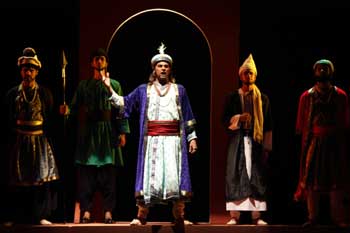Acting has its inspiration in nature
INVC NEWS
New Delhi,
21st BRM is breaking the boundaries, one such pathbreaking play Upal Bhaadury… Tale of a Dead Star was showcased on the night 12th of February. Upal Bhaadury is based on the life of a living legend Sri Chapal Bhaduri. He is a renowned female impersonator in Bengali Jatra. In the Directors meet the audience was enlightened by the Cast and Director about the hardships of the play and the societal difficulties faced by them. If one needs inspiration for acting one can find it in nature, just like nature acting is also free-spirited.
Youth Forum
Advitya saw an array of topics being addressed by college students. Students from colleges of Delhi University brought their annual productions to the National School of Drama’s 21st Bharat Rang Mahotsav. Social issues were raised in the premises Not a Childs Play a production of Aryabhata College that opened the eyes of audience towards children of war, Hansraj College performed Unlimited an issue that raised concern on depleting water levels, Atma Ram Sanatan Dharma College came with Cult-ture that questioned why do we need another god when we have 33 Crore of them.
Today’s Play
RICHARD III
Shakespeare’s conclusion to his epic Wars of the Roses chronicles, Richard III is a riveting portrayal of the politics of power, both personal and political, at their most devious and bloody. Deformed in body and spirit, this depraved madman is obsessed with becoming King of England. Does he fall? Of course, but not before he has taken all of us on his wickedly entertaining ride. Jealous and crippled, Richard of Gloucester murders his brothers, nephews, and any opposition to become King Richard III. In the end, Henry of Richmond raises an army, kills Richard in battle, and becomes King Henry VII.
ASHANTI NIWAS
This play begins with a series of family crises. All the members of this family are ambitious in their attempts to prove themselves. But living under the same roof, they fail to hold the family together. Each individual wants to take the entire family on his/her own journey. The patriarch of the household has a few expectations from his children but the children have different dreams. The play can be seen as a tussle between individual dreams and familial realities. As the play progresses, we find echoes of an entire nation in this household with each representative putting forward the problems concerning his field of interest. The social, political and economic aspects of the country are reflected in the bizarre yet relatable circumstances that one family encounters. All the relationships, ambitions and socio-political issues in this play have a satirical undercurrent.
TUGHLAQ
Tughlaq explores the series of events that led to the downfall of one of the most fascinating kings of Delhi, Mohammed-bin-Tughlaq. The protagonist, known for his reformist, ahead-of-times ideas had a grand vision, but his reign was an abject failure. He started his rule with great ideals of unifying India, but in twenty years his reign had degenerated into anarchy and his kingdom had become a ‘kitchen of death’.
The vision of Tughlaq to unify India and keep religion out of politics cost him dearly.
THE OLD MAN
As the play opens, the audience is acquainted with the fact that the protagonist of the story, the old fisherman Vodai, has gone 84 days without catching a single fish. ‘Vodai’ is considered the worst form of misfortune. In fact, this fisherman is so unlucky that his young apprentice, Rongmon, has been forbidden by his parents to sail with the old man, and been ordered to fish with more successful fishermen. Still dedicated to the old man, however, the boy visits Vodai’s hut each night, hauling back his fishing gear, getting him food and talking to him about his life journey and stories from his past…














